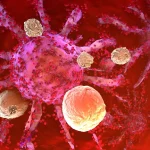With the recent development of numerous immunotherapies, among them checkpoint inhibitors, several types of cancer are now being treated with immunotherapy as part of the trajectory of care.
Immunotherapy in oncology is a fast-moving research sector. Other types of immunotherapy medication, as well as other cancers, could soon reap the benefits of discoveries in this field[i].
The primary cancers treated by immunotherapy in Québec are:
- melanoma
- non-small cell lung cancer
- kidney cancer
- bladder cancer
- Hodgkin’s lymphoma
- head and neck cancer
- hepatocellular carcinoma (liver)
- epidermoid cancer
- acute lymphoblastic leukemia (see point 5 in the section “Types of medication or immunotherapy treatments in oncology” in Immunotherapy)
- diffuse large B cell non-Hodgkin’s lymphoma (see point 6 in the section “Types of medication or immunotherapy treatments in oncology” in Immunotherapy)
Immunotherapy to fight melanoma
Melanoma, also known as malignant melanoma, is a cancer of the skin that occurs through the melanocytes, the cells that produce skin pigments and are responsible for skin color. A melanoma can manifest itself on normal skin, in a beauty mark, in the mucous membranes or in the eye.
There are different types of melanomas, with the most frequent ones being:
- Superficial spreading melanoma (SSM): this type of melanoma accounts for 70% of all melanoma cases and most often appears on the legs in women and around the chest in men. The associated tumor cells are habitually present with BRAF gene mutations (BRAF is a gene that produces a protein active in cell growth and division).
- Nodular melanoma: this type of melanoma accounts for 15 to 30% of all melanoma cases, and can present just about anywhere on the body. It is a very fast-growing cancer.
Melanomas are some of the cancers that respond the best to immunotherapy.
Since around 2010, clinical research has allowed for discovering various immunotherapy and targeted therapy medications that have changed the treatment landscape for advanced or metastatic melanomas.
This being said, surgery is still the primary treatment in cases of melanoma, and has the advantage of allowing practitioners to determine the stage of the cancer.
Immunotherapy treatments are indicated for treating stage IIb, III and IV melanomas. Immunotherapy can be administered on its own or by combining two immunotherapy medications. Based on the choice of treatment (a single therapy or a combination of two), between 40 and 50% of patients who undergo immunotherapy respond positively to treatment.
This treatment also prolongs life expectancy and for some patients, represents a full remission. These patients are prescribed an adjuvant treatment (following surgery) to address advanced or metastatic melanomas (stage III or IV).
The following immunotherapy medications are used in cases of melanoma:
- Alpha interferon (Intron-A) (rarely)
- Interleukin-2 (intralesion)
- Nivolumab (Opdivo)
- Pembrolizumab (Keytruda)
- Ipilimumab (Yervoy)
All of them can be given as a monotherapy (i.e., therapy consisting of a single medication). Nivolumab and Ipilimumab can also be administered together, as a combined treatment. The treatment can last anywhere from a few months to several years.
Immunotherapy for non-small cell lung cancer
Lung cancer manifests itself in various forms. The most frequent forms encountered are non-small cell lung cancer and small cell lung cancer. The terms “non-small cell” and “small cell” refer, among other things, to the difference in cancer cells when examined under a microscope. Non-small cell lung cancer is the most common type (80 to 85% of lung cancer diagnoses are cases of non-small cell lung cancer).
Immunotherapy treatments are indicated for inoperable stage III or metastatic stage IV non-small cell lung cancer.
The immunotherapy medications used to treat non-small cell lung cancer are the following checkpoint inhibitors:
- Durvalumab (Imfinzi)
- Atezolizumab (Tecentriq)
- Nivolumab (Opdivo)
- Pembrolizumab (Keytruda)
Durvalumab is indicated when monotherapy (one medication only) is used to treat inoperable stage III non-small cell lung cancer after a combination of chemotherapy and radiotherapy has been attempted. Nivolumab, Pembrolizumab and Atezolizumab are used in the palliative phase of stage IV or metastatic non-small cell lung cancer; these can be administered alone or in combination with chemotherapy.
Immunotherapy for kidney cancer
There are different types of kidney cancers, the one most frequently encountered being renal cell carcinoma with clear cell morphology (which accounts for over 80% of all kidney cancers). This is a silent cancer with few specific symptoms and which is often diagnosed in its later stages. If discovered early on, however, it can usually be treated with surgery, which entails removing all or part of the kidney. While there used to be very few effective treatments for advanced or metastatic cancers, treating advanced kidney cancers was revolutionized a few years ago by the use of targeted therapies. Immunotherapy was also recently added to the available therapeutic options. These two treatments (targeted therapy and immunotherapy) are indicated for treating advanced or metastatic cancers, i.e., stage III or IV.
Recently, advanced kidney cancer has been shown to benefit from a combination of two treatments, either two immunotherapies (two medications that stimulate the immune system) or an immunotherapy and a targeted antiangiogenesis therapy (which cuts off the blood supply to the cancer).
The following immunotherapy medications are used in cases of kidney cancer:
- Nivolumab (Opdivo)
- Pembrolizumab (Keytruda)
- Ipilimumab (Yervoy)
- Interleukine-2 (IV)
Nivolumab and Ipilimumab are administered together. Pembrolizumab is administered along with Axitinib (targeted antiangiogenesis therapy). Interleukin-2 is administered alone (monotherapy).
Immunotherapy for bladder cancer
Bladder cancer usually develops in the urothelial cells found in the bladder’s inner lining. This cancer is often referred to as urothelial carcinoma. 90% of bladder cancers are urothelial carcinomas. This type of cancer can affect the bladder, but also other parts of the urinary system, such as the ureter and the urethra.
It manifests itself in various forms, which are classified in specific groups based on their scope (progression):
- Bladder cancer that has not progressed to the bladder muscle (non-invasive): 75 to 85% of urothelial tumors:
- non-invasive papillary tumor (70%);
- flat tumor (in situ) (10%).
- Bladder cancer that has progressed to the muscle lining (invasive): 20% of urothelial carcinomas.
The immunotherapy medications described below are used to treat bladder cancers in Québec :
- Bacillus Calmette-Guérin or BCG
BCG is a bacteria transformed in the laboratory to ensure that it cannot trigger any disease. Its use results in a bladder inflammation that in turn triggers the immune system to attack and destroy cancer cells. This therapy is administered inside the bladder (intravesical) at regular intervals to address in situ carcinomas (non-invasive tumors). It is prescribed for use after surgery, i.e., once the tumor has been removed through natural means (transurethral resection of the bladder tumor [TURBT]).
- Avelumab (Bavencio)
It is used as a monotherapy (single therapy) for maintenance of an inoperable or metastatic advanced urothelial carcinoma.
Immunotherapy for Hodgkin’s lymphoma
Lymphoma is the general name used for a group of cancers that affect the lymphatic system. There are two major categories of lymphoma, namely Hodgkin’s lymphoma and non-Hodgkin’s lymphoma. Hodgkin’s lymphoma is different from non-Hodgkin’s lymphoma by virtue of the large abnormal lymphocytes that can be seen when looking through a microscope. It most often occurs among young people between the ages of 21 and 30 and in people over 60.
This type of cancer usually responds well to chemotherapy. Immunotherapy can also be an interesting option that gives good results, especially for some relapsed (returning) or unresponsive (that do not respond well to other treatments) lymphomas.
The immunotherapy medications used to treat Hodgkin’s lymphoma are the following checkpoint inhibitors:
- Nivolumab (Opdivo)
- Pembrolizumab (Keytruda)
Immunotherapy for head and neck cancers
Head and neck cancers are a group of cancers that touch the oto-rhino-laryngological region (ear-nose-throat) or the upper aerodigestive tract. They mainly impact the mouth cavity, larynx and pharynx. 90% of head and neck cancers are epidermoid carcinomas. Of late, immunotherapy has made great strides in conjunction with these types of cancer, and treatments now represent a new alternative for the vast majority of patients with returning or metastatic epidermoid carcinomas of the head and neck.
The immunotherapy medications used to treat head and neck cancers are the following checkpoint inhibitors:
- Nivolumab (Opdivo)
- Pembrolizumab (Keytruda)
Nivolumab can be administered as a therapy for epidermoid carcinomas of the head and neck which are either metastatic or locally advanced. Pembrolizumab can be administered alone (monotherapy) or in conjunction with chemotherapy to treat returning or metastatic epidermoid carcinomas of the head and neck.
Immunotherapy for hepatocellular carcinoma
Hepatocellular carcinoma is a malignant liver tumor. Initially appearing in the cells that constitute the majority of the liver, this cancer accounts for over 90% of all liver cancers. The vast majority of these tumors are associated with cirrhosis of the liver due to either hepatitis B, hepatitis C or excessive drinking.
Hepatocellular carcinoma is an aggressive cancer that has few symptoms and is often only discovered at an advanced stage. Depending on how far along the disease is, treatment options may include surgery and radiotherapy. There are fewer treatment options for advanced or metastatic cancers, and up until a few years ago, it was practically impossible to positively impact the most advanced cases. Luckily, we can now consider another type of treatment: targeted therapies. Immunotherapy was also recently observed to be a viable therapeutic option, specifically when combined with a targeted therapy. The treatment protocol in question consists of:
- Atezolizumab (Tecentriq) and Bevacizumab (Avastin)
This treatment is indicated for advanced or metastatic hepatocellular carcinomas that meet very specific selection criteria.
Immunotherapy for epidermoid cancer
Epidermoid cancer is a type of skin cancer. Immunotherapy is used to treat advanced or metastatic epidermoid carcinomas for which neither surgery nor radiotherapy is an option. The medication used for this type of skin cancer is the checkpoint inhibitor:
- Cemiplimab (Libtayo)
[i]The descriptions of the following treatments hinge on the knowledge of existing practices at the time this document was drafted.

































